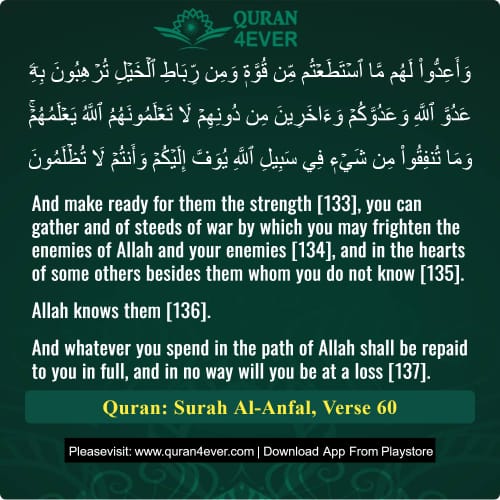
Transliteration:( Wa a'iddoo lahum mastata'tum min quwwatinw wa mirribaatil khaili turhiboona bihee 'aduwwal laahi wa 'aduwwakum wa aakhareena min doonihim laa ta'lamoo nahum Allaahu ya'lamuhum; wa maa tunfiqoo min shai'in fee sabeelil laahi yuwaffa ilaikum wa antum laa tuzlamoon )
"And make ready for them the strength [133], you can gather and of steeds of war by which you may frighten the enemies of Allah and your enemies [134], and in the hearts of some others besides them whom you do not know [135]. Allah knows them [136]. And whatever you spend in the path of Allah shall be repaid to you in full, and in no way will you be at a loss [137]."
This verse teaches that preparing for war at the right time is itself an act of worship, just as Wudu is necessary for Salah. The intention behind an act determines its value: a journey for Hajj is sacred, while one for burglary is sinful. Participating in war preparations can bring protection from the grave’s reckoning, and if Allah wills, resurrection with the soldiers of Islam. Even the desire to take part in Holy War is considered an act of worship.
Two rulings emerge from this:
It is permissible to instill fear in disbelievers—through preparation, display of strength, or even brave talk. Even dyeing a white beard black to inspire awe is allowed here, despite black dye being generally discouraged in Islam.
The enemy of Allah’s servants is the enemy of Allah Himself. Though the disbelievers acknowledged Allah as Creator, their hostility toward Muslims made them enemies of the Divine.
The verse reveals that Muslims face two types of enemies:
Open enemies – the disbelievers
Hidden enemies – the hypocrites, such as Abdullah ibn Ubay, later exposed by the Prophet ﷺ. Believers are warned to remain cautious of both.
This refers to hidden enemies, including hypocrites and even disbelieving jinn, who are struck with fear at the strength of Muslim warriors. According to Tafseer Roohul Bayaan, this fear extends beyond humans. The verse is a general command to the Muslim community.
Spending for Holy War or any Islamic cause is not a loss. Instead, it brings full repayment, with added blessings. The Companions of the Prophet ﷺ were enriched in this world through their sacrifices—a sign of Divine reward, apart from the rewards reserved in the Hereafter.
The tafsir of Surah Al-Anfal verse 60 by Ibn Kathir is unavailable here.
Please refer to Surah Anfal ayat 59 which provides the complete commentary from verse 59 through 60.
(8:60) Make ready for an encounter against them all the forces and well-readied horses you can muster[44] that you may overawe the enemies of Allah and your own enemies and others besides them of whom you are unaware but of whom Allah is aware. Whatever you may spend in the cause of Allah shall be fully repaid to you, and you shall not be wronged.
44. Muslims should he equipped with military resources and should have a standing army in a state of preparedness, in order that it may be used when needed. Never should it happen that the Muslims are caught unawares and have to hurriedly look around right and left to build up their defences and collect arms and supplies in order to meet the challenge of the enemy. For then it might be too late and the enemy might have accomplished its purpose.
[456]- Or equipment which serves the same purpose.

For a faster and smoother experience,
install our mobile app now.
Related Ayat(Verses)/Topics